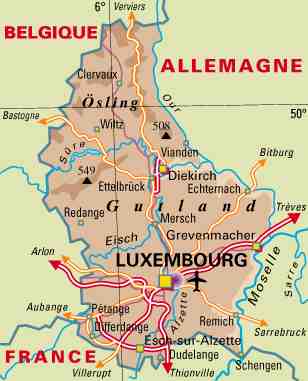
|
|
|
 |
The written history of Lucilinburhuc
(i.e. Luxembourg) starts in the year 963, when Siegfried, Count of the
Ardennes, and founder of the Luxembourg
dynasty, had a castle built on the territory of the present-day capital
of Luxembourg. This castle was the origin of the establishment of a town,
which later was to develop into a formidable fortress,
known by the name of 'Gibraltar of the North'. At its height, the fortress
was girdled by three ring-walls studded with 24 forts, and linked underground
by a 23 kilometre network of Casemates.
In 1994, Luxembourg City was listed as a UNESCO
World Heritage site.
After a long period of foreign sovereignty (Burgundian/ Spanish/ French/ Austrian / ...), the Congress of Vienna settled the destiny of the country, by raising it to the rank of Grand Duchy, and by giving it as personal property to the King of the Netherlands William I of Orange-Nassau. The personal union between Luxembourg and the Netherlands lasted until 1890. During this period the political independence and autonomy were strengthened, and the democratic institutions were developed. |
|
The 11th of May 1867 is one of the most important dates in national history. The Treaty of London reaffirmed Luxembourg's territorial integrity, and the political autonomy which had already been granted by the Treaty of Vienna of 1839. Furthermore, Luxembourg was declared perpetually neutral, and the great powers agreed to guarantee and to protect the neutrality of the Grand Duchy. Since 1890, when the Crown of the Grand Duchy passed to the elder branch of the House of Nassau, Luxembourg has had its own dynasty. The former ruler, H.R.H. Grand Duke Jean, succeeded his mother on the throne in November 1964, when she abdicated. His mother, Grand Duchess Charlotte, Duchess of Nassau, Princess of Bourbon Parma, died in 1985. Grand Duke Jean and his wife Grand Duchess Joséphine-Charlotte, the sister to Albert, King of the Belgians, have five children Henri, Jean, Guillaume, Marie-Astrid, and Margaretha. (See also The Grand-Ducal Family) On October 7, 2000 Grand-Duke Jean has appointed his son Henri as his successor. H.R.H. Grand-Duke Henri is therefore now in the exercise of power, as provided for by Article 42 of the Luxembourg Constitution. Executive power is in the hands of the Grand Duke and a Cabinet of 12 ministers. The legislative power rests with a Parliament (Chamber of Deputies) elected by men and women over 18, all of whom in Luxembourg have the right and duty to vote. (See also: Luxembourg Government) Despite its neutrality, Luxembourg was occupied twice by German troops during the two World Wars. The Battle of the Bulge was to a great extent fought on Luxembourg territory. In 1948, the country gave up its neutrality, to join the various economic, political, and military organisations of Europe. Already forming a close economic union with Belgium since 1921, the Grand Duchy is a founder member of the EU, and was host to the first European institutions in 1953. At present the following European Union institutions are based in Luxembourg: (See also:US site)
In addition, various other European Organisations (among which EFTA) also have offices in Luxembourg. Moreover, the sessions of the Council of Ministers take place in Luxembourg three months in the year. (April, June and October). (© Text by Luxembourg Tourist Office, 122 Regent Street London, W1R 5FE) |
|
 |